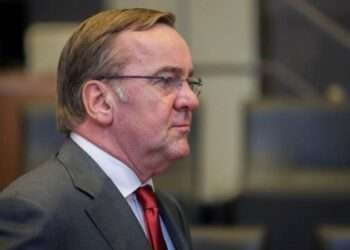Germany’s Interior Minister, Nancy Faeser has announced that controls at all of the country’s land borders are to be expanded.
This is aimed at confronting what it called “irregular migration” after a recent spate of suspected Islamist attacks.
Faeser said in a statement that the new regulations are due to start next Monday, September 16, 2024, and will be in place for an initial six months, before being reviewed.
The interior ministry said that it notified Brussels of the order to set up border controls at the land borders with France, Luxembourg, the Netherlands, Belgium and Denmark for a period of six months.
The controls come in addition to restrictions already in place on Germany’s land borders with Poland, the Czech Republic, Austria and Switzerland.
“We are strengthening domestic security and continuing our tough stance against irregular migration,” Faeser said.
“Until we achieve strong protection of the EU’s external borders with the new Common European Asylum System, we must increase controls at our national borders even more.”
Nancy Faeser
The announcement came ahead of a second round of emergency talks on migration policy due to be held on Tuesday in Berlin between the coalition government, opposition parties and federal states.
The measures are among a number of new rules Germany has introduced in recent years, following a large number of migrant arrivals, notably people escaping war and poverty in the Middle East and Africa.
Faeser’s announcement, which has the backing of the chancellor, Olaf Scholz, is seen as an attempt to regain control of a heated debate that has dominated recent state election campaigns with opposition and far-right and far-left candidates seizing on voters’ concerns over integration, security and overstrained public services including housing and education.
Recent fatal attacks in which the suspects were asylum seekers whose claims had been turned down and who were due to have been deported have fuelled agitation over immigration as well as the terms and conditions under which newcomers are given refuge and the right to stay in the country.
Most focus has been given to a knife attack that killed three at a festival in the western city of Solingen last month, for which the Islamic State group claimed responsibility. The main suspect was a man from Syria who was supposed to have been deported to Bulgaria where he had applied for asylum.
Migration remains the main issue on voters’ agenda ahead of an election in the northern state of Brandenburg in less than two weeks’ time.
Tension has been building on the issue over almost a decade.
In 2015, the government of Angela Merkel allowed about a million people, most of whom had fled Syria and Iraq, to arrive under what is sometimes referred to as an “open door” policy.
More recently, it automatically granted asylum to an estimated 1 million Ukrainians fleeing Russia’s 2022 invasion of their country, at the same time as Germany was tackling an energy and cost of living crisis.
Amid concerns over domestic security, tighter controls were introduced last year on Germany’s land borders with Poland, the Czech Republic and Switzerland.
Dutch Politician Hails Germany’s Decision
Dutch far-right politician, Geert Wilders praised Germany’s move to temporarily extend land border controls.
He said that the Netherlands should do the same.
However, the border controls are likely to be challenged within the EU especially if they result in German authorities insisting that other countries in the bloc take back large numbers of asylum seekers and migrants under the so-called Dublin Agreement rules.
Austria’s Interior Minister, Gerhard Karner, said that his country was not prepared to receive any migrants who were turned back at its border with Germany.
“There’s no room for manoeuvre over this,” he said.
According to EU legislation, countries in the Schengen region, which includes every member state except for Cyprus and Ireland, may introduce border controls only as a last resort, in order to prevent threats to internal security.
READ ALSO: Government’s Environmental Inactions Criticised, Calls for Emergency Action























